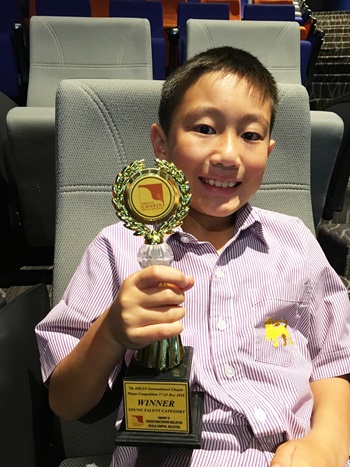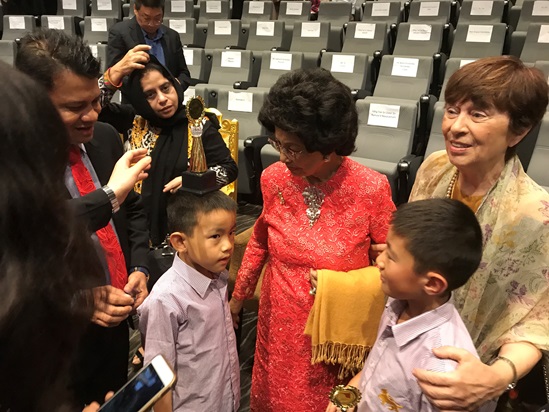
Lionel and Dillon Chan’s piano teacher had a hunch his young virtuosos were special, and recommended to their parents Lin and Jun that they enter the prestigious ASEAN International Chopin Piano Competition hosted by Persatuan Chopin Malaysia (the Malaysia Chopin Association), where Year 3 student Lionel and Dillon in Year 1 shared bronze in the Young Talents nine-years-and-under category.
The boys’ piano teacher, Glenn Riddle, Lecturer in Keyboard at the Melbourne Conservatorium of Music at the University of Melbourne, recognised that the repertoire for the ASEAN International Chopin Piano Competition at Sunway University in Kuala Lumpur in December 2018 was an opportunity for both students to perform pieces that were technically and expressively demanding.
According to Lin and Jun, the decision came after the Glen Waverley Campus students were announced as winners in the Golden Classical Music Awards international music competition in March 2018. The competition involved submitting video recordings, with the winners invited to take the stage for the finals competition at New York’s Carnegie Hall.
With that success under their belt and on the advice of Mr Riddle, Lionel and Dillon auditioned and made the final to perform in December 2018 in the Young Talents category of the Chopin Piano Competition, which attracts pianists from Australia, China, Hong Kong, Indonesia, Japan, Malaysia, Taiwan, Thailand and Singapore.
World class performance
'It was a tough competition with many established young talents,’ Lin said. ‘As the first performer in the Young Talents category, Lionel handled the pressure very well, performing a polyrhythmic Chopin Etude, Bach’s French Suite and a contemporary jazz piece in the Baroque style,’ Lin said.
‘Dillon played three intermediate-level pieces with lots of dynamic contrast,’ Jun said. ‘These were carefully selected for his small hands. They’re usually performed by students with three or so years of piano learning. Dillon tackled them after only 18 months or so of piano learning.’
‘Watching them perform these pieces, at six to eight minutes each, from memory, before a large audience and under the pressure of competition was terrifying for me,’ Lin said, ‘but I know they love the music, and really enjoy the thrill of performance.’
‘You see that enjoyment in the way the audience responded to their performances,’ Jun added. ‘There’s a lot of fun.’ Giving new meaning to the expression, ‘level headed,’ Dillon even entertained special guest, Malaysia’s First Lady, Dr Siti Hasmah, who is the Patron of Persatuan Chopin Malaysia, following the award ceremony by demonstrating how he could balance his bronze trophy on his head. ‘He certainly made the First Lady laugh,’ Jun said.
How do the boys best sum up the experience international competition? For Lionel, ‘It was exciting and made me feel loved.’ And for Dillon, ‘It was fun and made me feel proud.’ For both, the experience also helped them build international friendships.

Music fosters learning
There’s no denying music fosters learning, even if ‘The Mozart effect’ – the belief that simply exposing students to classical music, especially Mozart, improves outcomes – is doubtful. Research debunks the belief that simply listening to classical music promotes mental development and academic success, but does suggest that students who participate in rigorous music programs have higher than average achievement. The benefit, according to research, is linked to learning to play a musical instrument and, just as importantly, playing with others. Music practice and performance appears to foster discipline, collaboration, the ability to listen, interpret and think creatively, and the capacity to focus on several things at once.
Lifelong benefits
In support of those benefits, Wesley runs an extensive classroom music program and specialist tuition from Early Childhood to Year 12, providing opportunities for students to participate in choral, strings, wind, chamber music and jazz ensembles, as well as learn music theory and composition, and practical music skills like music promotion and recording.
For the Glen Waverley Campus students, playing the piano is its own reward, but there are schooling benefits in terms of concentration, goal setting and responding to instruction and feedback.
As Dillon’s classroom music teacher Jenny Lee explained, Dillon displays clear focus and attention to detail. ‘Dillon is a typical five-year old in many ways, keen to socialise with his friends and enjoy the more active and hands-on elements of his classroom music learning,’ Ms Lee said. ‘It is when Dillon is at the piano that his focus and attention to detail becomes apparent. At the piano, Dillon transforms, showing his enjoyment and expressive care of every note he is playing.’
Fellow classroom music teacher Lyn Richardson, observed that musical learning helps students develop their ability to work independently, and set and realise learning goals, noting that Lionel is able to work independently and enjoys investigating ways to advance tasks further. ‘Lionel is quick to grasp nuances in rhythms and melodies played within the classroom music curriculum, showing a good ability to transfer musical language onto the range of tuned and untuned percussion instruments used,’ Ms Richardson said. ‘He is able to intellectualise the layering up of musical patterns in much of the ensemble work covered as well.’
Loving learning
Lionel and Dillon both emphasise the social aspect of playing the piano. ‘What I like about playing piano is that I get to share the music,’ Lionel said. For Dillon, ‘I like playing because my friends enjoy my music.’ Both boys are also passionate about the music itself. ‘My favourite piece at the moment is French Suite Number 5 by Bach, because of its joyful rhythm,’ Lionel said. ‘Mine is Dmitry Kabalevsky's Piano Sonata Number 2, because it makes me feel like I really play like a pianist,’ Dillon said.
Preparing for the ASEAN International Chopin Piano Competition required plenty of practice. According to Lionel, ‘Encouragement from my parents and teachers was crucial,’ while for Dillon, reward stickers and cuddles and kisses from his mum and dad really helped.
Both boys note that piano practice and performance helps them in class. ‘When I need to speak in front of my class, I feel confident,’ Lionel said. For Dillon, ‘It just makes me feel more confident.’
Lionel and Dillon have been selected to perform in the 2019 American Protégé International Piano and Strings Competition in the Young Musicians category at Carnegie Hall in April. ‘The boys are thrilled to be making their way to New York to perform at Carnegie Hall in 2019,’ Jun said.
